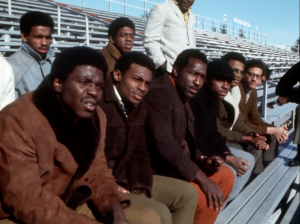(ThyBlackMan.com) The Wyoming college football program isn’t known for much other than producing former star and current Buffalo Bills quarterback Josh Allen but that wasn’t always the case. Wyoming Cowboys football was very popular in the city of Laramie, Wyoming during the 1960s. Their head coach, Lloyd Eaton had led the team three consecutive Western Athletic Conference championships during the 1960s. From 1966 to 1968, the football program went 27-5 with two 10 win seasons. However, at the height of the Civil Rights Movement, the Wyoming football team’s 14 black players, who protested and were dismissed from the squad, made history that should still be celebrated 50 years ago.
There was a lot of hype and expectation for the Wyoming Cowboys college football team, which included 14 black players from across the country, heading into the 1969 season. Wyoming started that season undefeated in its first four games. However, the football team had their next scheduled game versus Brigham Young University, owned and operated by the Church of Jesus Christ of Latter-day Saints, which held discriminatory policies against black people regarding priesthood and the church. The black players on the Wyoming team, known as the Black 14, wore black armbands in solidarity against these policies. During a meeting with the black players a day before the Brigham Young football game, head coach Lloyd Eaton ,dismissed all of them from the team for their wearing the armbands in protest while berating the players for their silent protest.
season undefeated in its first four games. However, the football team had their next scheduled game versus Brigham Young University, owned and operated by the Church of Jesus Christ of Latter-day Saints, which held discriminatory policies against black people regarding priesthood and the church. The black players on the Wyoming team, known as the Black 14, wore black armbands in solidarity against these policies. During a meeting with the black players a day before the Brigham Young football game, head coach Lloyd Eaton ,dismissed all of them from the team for their wearing the armbands in protest while berating the players for their silent protest.
The story of the Black 14 blew up after the Wyoming and BYU football game, which was still played and won by the now all-white Wyoming football team. National news outlets and newspapers picked up on the story of the black 14 football players, their dismissal, and the controversy. The Black 14 sparked a demand for change, protests, and demonstrations around the Western Athletic Conference including from various opponents playing against Wyoming, who protested in solidarity. The all-white Wyoming team won two more games following the BYU game but lost four of the remaining games in the season. Following the 1970 season, Lloyd Eaton stepped down as head coach following a very disappointing losing season with just one win and the treatment of the Black 14 led to losing seasons for the football program for several years as it became extremely tough to recruit black athletes to the football team.
It seems that the Black 14 do not regret their decision to this day even if they knew the exact same actions would happen and virtually all of those men found success after their dismissal due to their protest. Former Black 14 members went on to success in their lives. Jay Berry became an award-winning sports anchor. He still holds two Wyoming defensive records from the four games he played in 1969. Tony Gibson and his wife Barbara moved home to Massachusetts when he worked as a lineman for a power company for 38 years. John Griffin graduated from Wyoming in 1972 and worked as a project manager for United Airlines. Mel Hamilton stayed at Wyoming to finish his degree. He was a coach, teacher, and school administrator in Casper, WY until retiring to South Carolina. Guillermo Hysaw earned advanced degrees in marketing, strategic management, and finance. He had a 34-year career as an automotive industry executive. Tony McGee transferred to Bishop College in Dallas, TX and had a 14-year career in the NFL. He won a Super Bowl with Washington in 1983. Lionel Grimes transferred to Findlay University to play college baseball.
Ron Hill transferred to Howard University and became a P.E. teacher in Denver and Texas. Jim Isaac graduated from Dakota Wesleyan University and was a teacher in Arizona and Wyoming. He died in 1976. Earl Lee had a long career as a coach, teacher, and principal in the Baltimore area. He died in 2008. Don Meadows graduated from Wyoming and became a financial planner in Seattle. He raised his daughter as a single father and died in 2009. Ivie Moore fell out of contact with the rest of The Black 14. His whereabouts are unknown. Joe Williams played in he NFL for New Orleans and Dallas. He won a Super Bowl with the Cowboys in 1972. Ted Williams returned to the Wyoming football team in 1970. He worked as the foreman at a paint company in Illinois.
In 1972, after three years of arguments and appeals, the Black 14’s lawsuit was dismissed by the U.S. Circuit Court. But in June 1979, the Mormon Church changed its policy to allow African-American men into the priesthood. In October 2017, the Institute for Sport and Social Justice honored the Black 14 with a Giant Steps Award. The Black 14 legacy is a hidden but important one.
Staff Writer; Mark Hines
















Leave a Reply